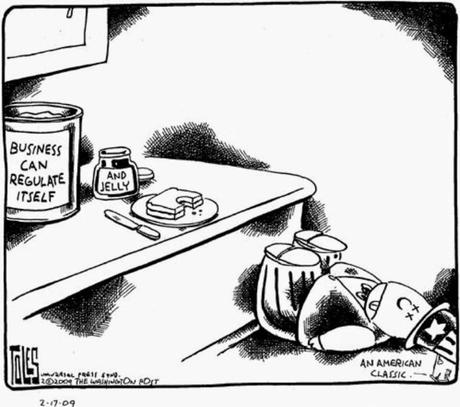
 Libertarians and conservative Republicans (and their "think tanks") agree on one thing. They both believe in "free enterprise" -- a free and unregulated market (a capitalism with no rules). The Libertarians can't do much about it, but the conservative Republicans have been trying to force their free market utopia on this country for decades (since the Reagan administration).
Libertarians and conservative Republicans (and their "think tanks") agree on one thing. They both believe in "free enterprise" -- a free and unregulated market (a capitalism with no rules). The Libertarians can't do much about it, but the conservative Republicans have been trying to force their free market utopia on this country for decades (since the Reagan administration).And they have been fairly successful in that effort, by giving unregulated capitalism a new name -- "Trickle-Down" economics. They had a lot of Americans fooled into believing that removing regulations on corporations and financial institutions, destroying (or at least weakening) labor unions, and cutting taxes for the rich and corporations would be beneficial for all Americans.
They lied. What it really did was shrink the middle class, stagnate wages for most Americans, induce the exporting of good American jobs, increase poverty, and cause the biggest recession in this country since the Great Depression (a recession that many Americans still haven't recovered from). That doesn't matter to the Republicans -- who only care about putting more money into the pockets of their rich friends and donors. They could care less about ordinary Americans, and because of that, they still cling to their failed economic policy.
Former Labor Secretary Robert Reich says they are sending America back to the late Nineteenth Century, and he has a point. The Republicans would love to replay that time in American history -- a time when Big Business ruled, and workers had no rights. Here is what he had to say:
My recent column about the growth of on-demand jobs like Uber making life less predictable and secure for workers unleashed a small barrage of criticism from some who contend that workers get what they’re worth in the market. A Forbes Magazine contributor, for example, writes that jobs exist only “when both employer and employee are happy with the deal being made.” So if the new jobs are low-paying and irregular, too bad. Much the same argument was voiced in the late nineteenth century over alleged “freedom of contract.” Any deal between employees and workers was assumed to be fine if both sides voluntarily agreed to it. It was an era when many workers were “happy” to toil twelve-hour days in sweat shops for lack of any better alternative. It was also a time of great wealth for a few and squalor for many. And of corruption, as the lackeys of robber barons deposited sacks of cash on the desks of pliant legislators. Finally, after decades of labor strife and political tumult, the twentieth century brought an understanding that capitalism requires minimum standards of decency and fairness – workplace safety, a minimum wage, maximum hours (and time-and-a-half for overtime), and a ban on child labor. We also learned that capitalism needs a fair balance of power between big corporations and workers. We achieved that through antitrust laws that reduced the capacity of giant corporations to impose their will, and labor laws that allowed workers to organize and bargain collectively. By the 1950s, when 35 percent of private-sector workers belonged to a labor union, they were able to negotiate higher wages and better working conditions than employers would otherwise have been “happy” to provide. But now we seem to be heading back to nineteenth century. Corporations are shifting full-time work onto temps, free-lancers, and contract workers who fall outside the labor protections established decades ago. The nation’s biggest corporations and Wall Street banks are larger and more potent than ever. And labor union membership has shrunk to fewer than 7 percent of private-sector workers. So it’s not surprising we’re once again hearing that workers are worth no more than what they can get in the market. But as we should have learned a century ago, markets don’t exist in nature. They’re created by human beings. The real question is how they’re organized and for whose benefit. In the late nineteenth century they were organized for the benefit of a few at the top. But by the middle of the twentieth century they were organized for the vast majority. During the thirty years after the end of World War II, as the economy doubled in size, so did the wages of most Americans — along with improved hours and working conditions. Yet since around 1980, even though the economy has doubled once again (the Great Recession notwithstanding), the wages most Americans have stagnated. And their benefits and working conditions have deteriorated. This isn’t because most Americans are worth less. In fact, worker productivity is higher than ever. It’s because big corporations, Wall Street, and some enormously rich individuals have gained political power to organize the market in ways that have enhanced their wealth while leaving most Americans behind. That includes trade agreements protecting the intellectual property of large corporations and Wall Street’s financial assets, but not American jobs and wages. Bailouts of big Wall Street banks and their executives and shareholders when they can’t pay what they owe, but not of homeowners who can’t meet their mortgage payments. Bankruptcy protection for big corporations, allowing them to shed their debts, including labor contracts. But no bankruptcy protection for college graduates over-burdened with student debts. Antitrust leniency toward a vast swathe of American industry – including Big Cable (Comcast, AT&T, Time-Warner), Big Tech (Amazon, Google), Big Pharma, the largest Wall Street banks, and giant retailers (Walmart). But less tolerance toward labor unions — as workers trying to form unions are fired with impunity, and more states adopt so-called “right-to-work” laws that undermine unions. We seem to be heading full speed back to the late nineteenth century. So what will be the galvanizing force for change this time?
 This cartoon is by Tom Toles in The Washington Post.
This cartoon is by Tom Toles in The Washington Post.

